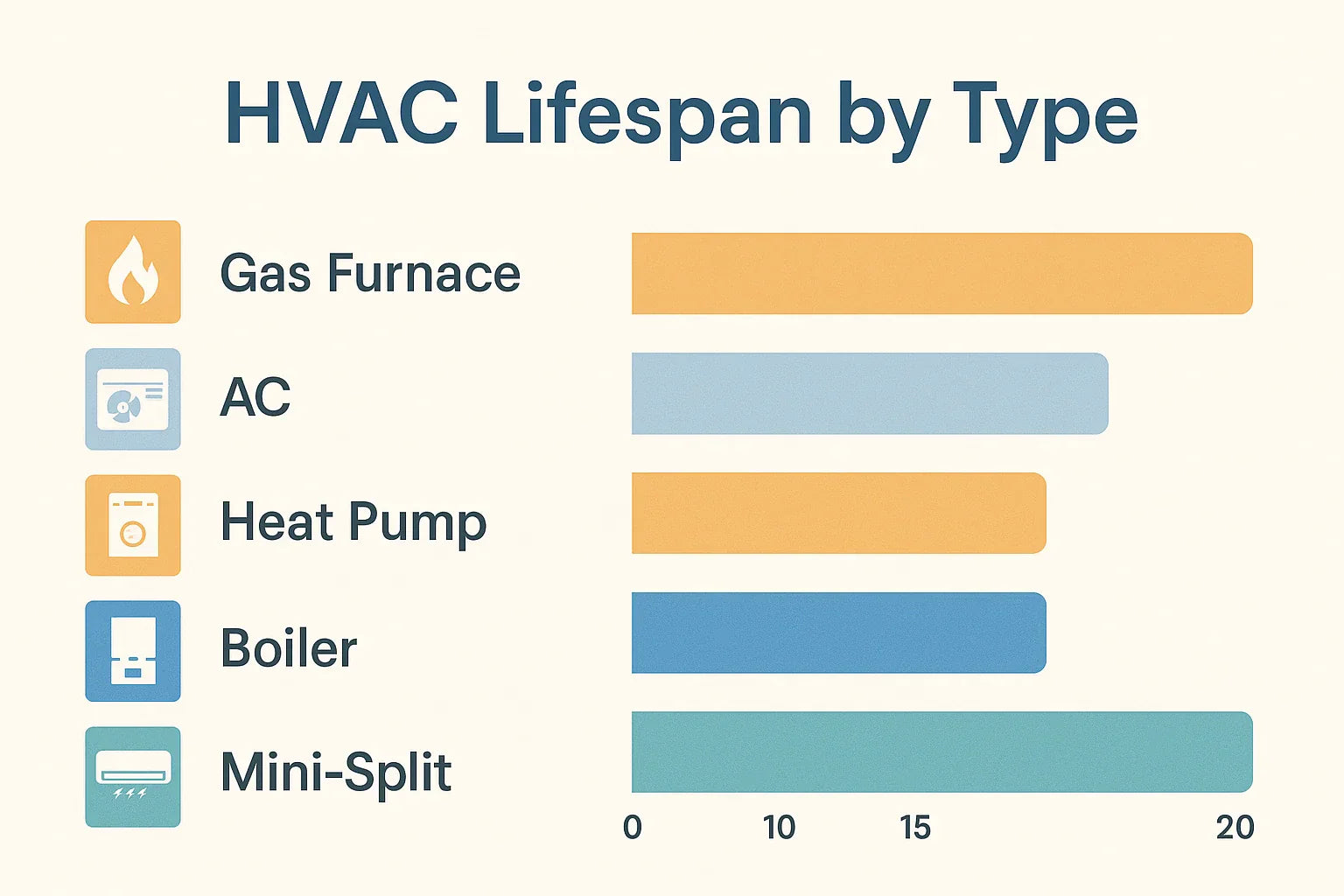By Alex Lane | Your Home Comfort Advocate
One of the most overlooked factors in HVAC decision-making is the simplest: age.
Even with perfect maintenance, every system reaches a point where repairs are no longer worth it. But how do you know when that point is? What’s “too old” for a furnace, AC, or heat pump?
In this guide, we’ll break down the typical lifespans of major HVAC system types, signs that age is catching up with your equipment, and what to do if you’re on the fence about repair vs. replacement.
Why Age Matters More Than You Think
A lot of homeowners focus on what’s broken today—but not how many more tomorrows their system really has. Here’s why system age should always be part of your decision:
-
Efficiency declines over time, even if the system still runs
-
Old parts may be discontinued, making repairs slower and more expensive
-
Older systems may use phased-out refrigerants like R-22
-
Warranty coverage typically expires after 10 years, meaning you’re on the hook for every repair
According to Energy Star, if your HVAC equipment is more than 10–15 years old, replacement should be considered—especially if you’re experiencing comfort or efficiency issues.
HVAC System Lifespan by Type
Not all systems age the same. Here’s what to expect based on the equipment you have.
Central Air Conditioner
Average lifespan: 10–15 years
-
Systems exposed to extreme heat or lack of shade may wear faster
-
Common age-related issues: refrigerant leaks, coil corrosion, short cycling
-
R-22 units (used in older ACs) are expensive and often not worth repairing
📘 Source: Carrier – How Long Do AC Units Last?
Gas Furnace
Average lifespan: 15–20 years
-
Older furnaces tend to lose efficiency (dropping below 80% AFUE)
-
Warning signs with age: ignition failure, cracked heat exchangers, noisy operation
📘 Source: This Old House – Furnace Lifespan Explained
Heat Pump
Average lifespan: 10–15 years
-
Lifespan varies by climate: shorter in extreme cold unless it’s a cold-climate model
-
Age-related issues: defrost cycle failure, compressor noise, poor airflow
📘 Source: DOE – Heat Pump Basics
Ductless Mini-Split
Average lifespan: 15–20 years
-
Usually last longer due to less duct-related strain
-
Watch for signs like refrigerant line deterioration, control board glitches, and inconsistent temps
📘 Source: SSBHC – How Long Do Mini-Splits Last?
Boiler (Gas/Oil)
Average lifespan: 15–25 years
-
Longer-lasting if water is treated and system is flushed regularly
-
Red flags: leaks, corrosion, uneven heat, and clunking sounds
📘 Source: HVAC.com – Boiler Maintenance Checklist
When Age = Time to Replace
Signs Age Is Affecting Performance
-
Increased energy bills despite no lifestyle changes
-
Frequent repairs—especially on major parts
-
Unusual noises or smells
-
Hot/cold spots in your home
-
No warranty coverage left
-
Uses outdated refrigerants like R-22
These signs usually mean you’re pouring money into a system that’s only getting weaker.
When Maintenance Can Still Extend the Life
Not all aging systems need to be replaced right away. If you’ve been diligent about:
-
Annual tune-ups
-
Changing filters regularly
-
Clearing outdoor units of debris
-
Fixing small issues early
…then you might get a few more years of reliable service. Just keep a close eye on efficiency and comfort levels.
📘 Source: DOE – Maintaining Your Air Conditioner
How to Check the Age of Your HVAC System
Locate the Serial Number
-
Find the nameplate (usually on the unit’s side panel or inside access door)
-
Look for a model and serial number
-
Most brands encode the manufacture date (e.g., “4214A” = 42nd week of 2014)
Not sure how to decode yours? Your HVAC contractor can help during a maintenance visit.
Questions to Ask During Your Next Service Call
-
“How long should this unit realistically last?”
-
“Is it still under warranty?”
-
“Are parts still available for this model?”
-
“What’s its efficiency rating compared to new models?”
The answers will help you decide whether to budget for one last repair—or for a full replacement.
Final Thoughts from Alex Lane
Age alone isn’t always a dealbreaker—but when it combines with inefficiency, repairs, and rising energy bills, it’s usually a clear signal to move on.
“If your HVAC system is over 15 years old and underperforming, don’t wait until it quits in the middle of summer. Start planning now and get ahead of costly surprises.”
Coming up next: When Repairs Make Sense: Extending the Life of Your HVAC System, where I’ll share practical tips to stretch your system’s lifespan when replacement isn’t yet on the table.
Recap: Typical HVAC Lifespan by System Type
| System Type | Average Lifespan |
|---|---|
| Central AC | 10–15 years |
| Gas Furnace | 15–20 years |
| Heat Pump | 10–15 years |
| Mini-Split | 15–20 years |
| Boiler | 15–25 years |
Alex Lane
Your Home Comfort Advocate







